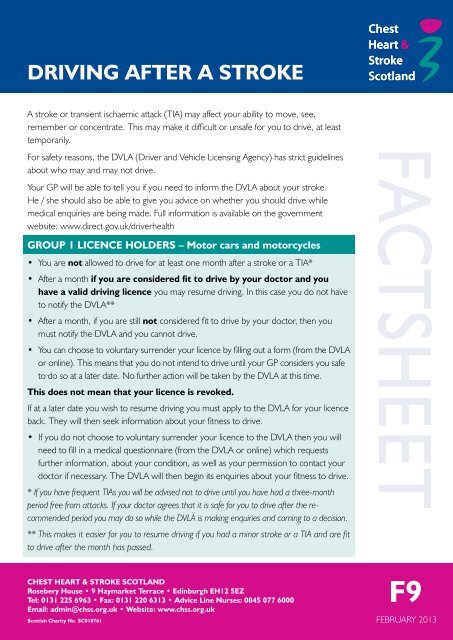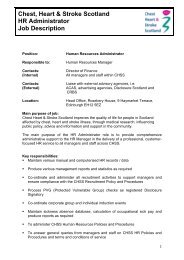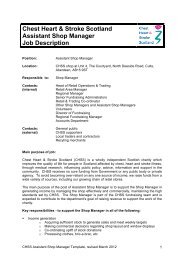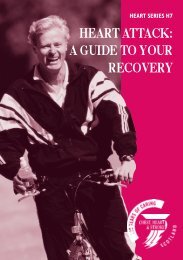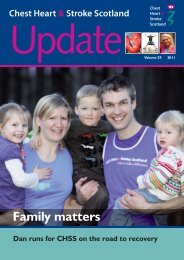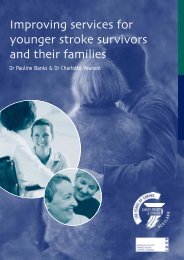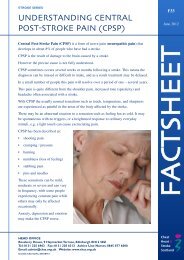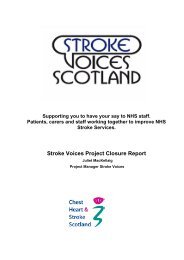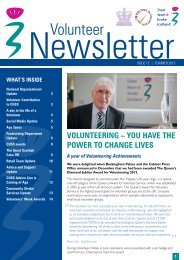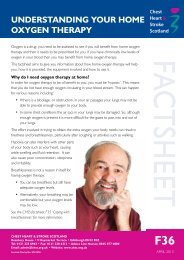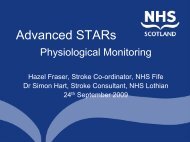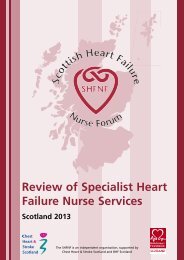CHSS Fact sheet Driving after a stroke - Chest Heart & Stroke Scotland
CHSS Fact sheet Driving after a stroke - Chest Heart & Stroke Scotland
CHSS Fact sheet Driving after a stroke - Chest Heart & Stroke Scotland
- No tags were found...
You also want an ePaper? Increase the reach of your titles
YUMPU automatically turns print PDFs into web optimized ePapers that Google loves.
DRIVING AFTER A STROKEA <strong>stroke</strong> or transient ischaemic attack (TIA) may affect your ability to move, see,remember or concentrate. This may make it difficult or unsafe for you to drive, at leasttemporarily.For safety reasons, the DVLA (Driver and Vehicle Licensing Agency) has strict guidelinesabout who may and may not drive.Your GP will be able to tell you if you need to inform the DVLA about your <strong>stroke</strong>.He / she should also be able to give you advice on whether you should drive whilemedical enquiries are being made. Full information is available on the governmentwebsite: www.direct.gov.uk/driverhealthGRoup 1 LiCENCE HoLdERS – Motor cars and motorcycles• You are not allowed to drive for at least one month <strong>after</strong> a <strong>stroke</strong> or a TIA*• After a month if you are considered fit to drive by your doctor and youhave a valid driving licence you may resume driving. In this case you do not haveto notify the DVLA**• After a month, if you are still not considered fit to drive by your doctor, then youmust notify the DVLA and you cannot drive.• You can choose to voluntary surrender your licence by filling out a form (from the DVLAor online). This means that you do not intend to drive until your GP considers you safeto do so at a later date. No further action will be taken by the DVLA at this time.This does not mean that your licence is revoked.If at a later date you wish to resume driving you must apply to the DVLA for your licenceback. They will then seek information about your fitness to drive.• If you do not choose to voluntary surrender your licence to the DVLA then you willneed to fill in a medical questionnaire (from the DVLA or online) which requestsfurther information, about your condition, as well as your permission to contact yourdoctor if necessary. The DVLA will then begin its enquiries about your fitness to drive.* If you have frequent TIAs you will be advised not to drive until you have had a three-monthperiod free from attacks. If your doctor agrees that it is safe for you to drive <strong>after</strong> the recommendedperiod you may do so while the DVLA is making enquiries and coming to a decision.** This makes it easier for you to resume driving if you had a minor <strong>stroke</strong> or a TIA and are fitto drive <strong>after</strong> the month has passed.FACTSHEETCHEST HEART & STROKE SCOTLANDRosebery House • 9 Haymarket Terrace • Edinburgh EH12 5EZTel: 0131 225 6963 • Fax: 0131 220 6313 • Advice Line Nurses: 0845 077 6000Email: admin@chss.org.uk • Website: www.chss.org.ukScottish Charity No. SC018761F9FEBRUARY 2013
FACTSHEETGRoup 2 LiCENCE HoLdERS – Lorries and busesThe medical standards are much stricter in this category because of the size and weightof the vehicles and also the length of time you may spend at the wheel in the course ofyour occupation.• The DVLA has to be notified and your licence will be revoked for at least 12 monthsfollowing a <strong>stroke</strong> or TIA.• You can be considered for licensing <strong>after</strong> this period provided that there is no barringresidual impairment likely to affect safe driving and there are no significant risk factors.• Licensing may be subject to satisfactory medical reports including exercise ECGtesting.TaxisThe Transport Select Committee in 1995recommended that local councils should applyGroup 2 medical standards to taxi drivers.Therefore you should check with your locallicensing council that you are still licensed todrive your taxi.When to contact the dVLAThe DVLA produces an information booklet ‘Car or motorcycle drivers who have had a<strong>stroke</strong> or transient ischaemic attack (TIA)’. It states the following:You do not need to tell us about a TIA.If you have had a <strong>stroke</strong> you do need to tell us if any of the following apply:• One month <strong>after</strong> the <strong>stroke</strong> you are still suffering from weakness of the arms or legs,visual disturbance, or problems with co-ordination, memory or understanding.• You have had a seizure of any kind, other than within the 24 hours <strong>after</strong> the <strong>stroke</strong>.• You needed brain surgery as part of the treatment for the <strong>stroke</strong>.• You have had more than one <strong>stroke</strong> within the past three months.• Your doctors have said they are concerned about your ability to drive safely.
• You hold a current Large Goods Vehicle (LGV) or Passenger Carrying Vehicle (PCV)(Group 2) driving licence.If you are not sure whether any of the above apply to you, discuss the matter with yourdoctor.Disability of your arms or legs <strong>after</strong> a <strong>stroke</strong> may not prevent you from driving. You maybe able to overcome driving difficulties by driving an automatic vehicle or one with ahand-operated accelerator and brake.If there are any restrictions on the types of vehicle you can drive, these must be shownon your driving licence.In the interests of road safety, you must be sure that you can safely control a motorvehicle at all times.Contact the DVLA to obtain the following forms:• Form ‘Declaration for voluntary surrender’• Appropriate medical questionnaire to assess your fitness to drive STR1 ‘Confidentialmedical information’• The leaflet TIA1 ‘Car or motorcycle drivers who have had a <strong>stroke</strong> or transientischaemic attack (TIA)’How to contact the DVLA• Enquiries for car drivers and motorcyclists: 0300 790 6806• Enquiries for bus coach lorry drivers: 0300 790 6807• Write to:Drivers Medical GroupDVLASwanseaSA99 1TU• Email: eftd@dvla.gsi.gov.uk• Download online: www.direct.gov.uk/driverhealthFACTSHEET
IF YOUR LICENCE IS REVOKEDIf your condition improves and your doctor thinks you are now fit to drive you canre-apply for your licence.If it is considered that you are still unsafe to drive your licence will remain revoked.Be aware that the DVLA can also revoke your licence for non-compliance, for instance ifyou:• fail to send back an appropriately completed questionnaire• refuse permission for your doctor to be approached• refuse to agree to any of the assessments requestedYou are not allowed to drive until your licence is subsequently re-issued by the DVLA.PROVISIONAL DISABILITY ASSESSMENT LICENCEIf you are re-applying for your licence, <strong>after</strong> it has beenrevoked, the DVLA will have the option of issuing aLProvisional Disability Assessment Licence (PDAL).This will allow you to be fully assessed, including on road,by the <strong>Driving</strong> Assessment Service to determine yourfitness to drive. The conditions of the licence may limityou to driving only for the duration of the assessment orfor a specified period of time for driving tuition. You willbe subject to learner conditions, such as ‘L-plates’, anddriving under supervision. If the assessment is satisfactory, the DVLA may restore yourlicence.FACTSHEET
INSURANCEIf you are considered fit to drive and wish to resume driving you must let your insurancecompany know about your <strong>stroke</strong> or TIA and any modifications to your vehicle. If youfail to inform them, and have to make a claim, you may find you are not insured as someinsurers oblige drivers to inform them of any changes to their personal circumstances.Your insurance company may want a doctor’s report to say if it is safe for you to driveagain. You may have to look for another company if they are unable to provide cover.See the <strong>CHSS</strong> fact<strong>sheet</strong> ‘Sympathetic insurance companies’ for more information.ADDITIONAL INFORMATION ABOUT DRIVING LESSONSYou can only have driving lessons if you have a valid licence and your doctor has agreedyou are fit to drive.If you have surrendered your licence or your licence has expired and you wish tohave driving lessons before you go back to driving, you are required to apply to theDVLA to obtain your licence. Once you have applied to DVLA and have documentationto say you have done so, you are able to have lessons under Section 88 of the RoadTraffic Act if your doctor has agreed you are fit to drive.if your licence has been revoked you cannot have lessons.The DVLA may be unaware that you have had a <strong>stroke</strong> if you decided not to go back todriving. If at a later date you decide to do so you can only have lessons once you haveinformed the DVLA, have a valid driving licence and your doctor has agreed you are fit todrive.COST OF LESSONS<strong>CHSS</strong> personal Support GrantsThe <strong>CHSS</strong> Personal Support Grants programme may be able to offer assistance with thecost of lessons. For more information about grants email: personalgrants@ chss.org.ukor telephone: 0131 225 6963.‘Access to Work’Drivers who have had a <strong>stroke</strong> and are trying to return to work could also ask ‘Accessto Work’ for assistance. Ask the Disability Employment Adviser (DEA) at your localJobcentre for more information.FACTSHEET
FACTSHEETFURTHER REFERENCEDVLA General Drivers Enquiries: Tel: 0300 790 6801Medical Standards of Fitness to Drive are reviewed and updated every 6 months andare available on the DVLA website: www.dvla.gov.uk/medical/ataglanceFor further information about motoring and transport issues see: www.direct.gov.uk• ‘Motoring: Your health and driving’• ‘Disabled people: Motoring and transport’Hard copies of information leaflets about health and motoring may also be available fromyour Post Office.<strong>CHSS</strong> would like to thank Janet Wightman and the Scottish <strong>Driving</strong> Assessment Servicefor their help in producing this fact<strong>sheet</strong>.if you would like to speak to one of our nurses in confidence,please call the <strong>Chest</strong> <strong>Heart</strong> & <strong>Stroke</strong> <strong>Scotland</strong> Advice Line0845 077 6000The Advice Line is open from Monday to Friday 9.30am - 4pm.


